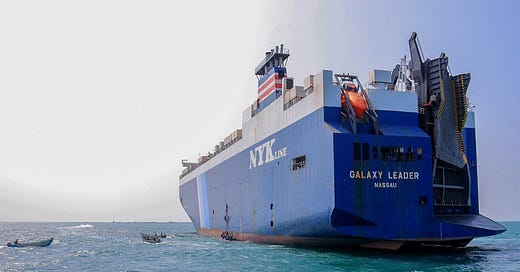Red Sea Attacks by Houthi Rebels Disrupt Global Supply Chains
Iran-backed, pro-Hamas rebels in Yemen have disrupted global trade, particularly in oil, by making the entry to the Red Sea and the onward route to the Suez Canal unsafe.
Houthis Intensify Threats Amidst International Security Efforts
In a defiant response to international security initiatives, the Houthi rebels in Yemen, aligned with Iran and supportive of Hamas, Tuesday have publicly reiterated their intention to escalate their maritime campaign. They have specifically vowed to target commercial vessels associated with Israel and its supporting nations that traverse the strategic waters waters of the Red Sea, to and from the Suez Canal.
This strategic maritime conduit, flanked by the Suez Canal to the north and the Bab el-Mandeb Strait (Gate of Tears) to the south, is now facing a surge in security threats. The militants' proclamation of continued aggression was timed conspicuously close to the announcement on Monday by the United States of its leadership in a collaborative effort to secure the route, signaling a significant escalation in regional tensions.
Heightened Risks in the Red Sea
The Red Sea, a crucial maritime route, has become a zone of conflict as Houthi militants intensify their attacks on commercial vessels. This escalation has prompted major shipping companies, including British Petroleum and Maersk, to halt operations in the region to safeguard their fleets and crew.
Danger Versus Efficiency
The trade-off between speed and safety is becoming stark. With the Houthi attacks making headlines, companies must weigh the risks of the quicker passage through the Suez Canal against the longer, but safer, route around the Cape of Good Hope.
Impact on Global Trade
These disruptions are far-reaching, affecting not just the cost and efficiency of shipping but also the global supply chains that rely on this critical maritime link. The rerouting of ships due to the perceived threat has caused a domino effect, with oil futures and insurance costs rising.
International Security Initiative
Coalition Forces Bolster Red Sea Security
The international community has taken significant measures to heighten security in the Red Sea region amidst the growing threats to maritime commerce. Leading this effort, the United States has strategically positioned the USS Dwight D. Eisenhower aircraft carrier, a formidable force, as both a symbol and instrument of deterrence against Houthi aggression. This move is part of a broader international coalition effort to enhance naval operations and ensure safe passage for commercial vessels through these geopolitically sensitive and economically vital waters.
Indian Naval Vigilance in the Red Sea
Enhanced Maritime Security by Indian Navy
The Indian Navy's commitment to safeguarding its maritime interests is demonstrated through its prompt response to the MV Ruen hijacking. Deploying the INS Kochi near the hijacked vessel and assigning the INS Kolkata to reinforce security at Aden's strategic maritime point underscores India's proactive approach in a piracy-prone area. These actions, aligning with the US-led Operation Prosperity Guardian, highlight India's role in countering Shia Houthi threats and ensuring the safety of commercial navigation in the Red Sea. Additionally, the INS Kochi recently provided critical medical assistance to an injured sailor from MV Ruen, further exemplifying its crucial role in regional maritime security.
Shipping Strategies in Crisis
The ripple effects of the conflict are evident in the shipping industry’s patterns, with a noticeable diversion of cargo ships to avoid the troubled waters of the Red Sea. The situation underscores the vulnerability of global trade routes to regional conflicts.
Navigating the Red Sea Dilemma
With a considerable percentage of the world’s container shipping now circumventing the Suez Canal, the economic implications are significant. Companies and countries must navigate the complex security dynamics of the Red Sea while ensuring the continuity of international trade.
Navigating Towards Stability Amid Global Challenges
In our interdependent world, the smooth flow of oil and gas remains a cornerstone of global economic stability. These critical resources continue their journey across oceans predominantly by oil tankers, a testament to the enduring importance of maritime trade routes. Despite the ambitious environmental commitments made at COP28 in the UAE, the reality of our current energy landscape is that the ripples of the Israel-Gaza conflict have far-reaching implications.
It is within this delicate context that the world holds its breath, cautiously optimistic for the success of the United Nations Security Council's latest efforts to negotiate a ceasefire. The hope is that this time, progress will be made beyond the stalemates often attributed to veto powers, and that a resolution will emerge to affirm the effectiveness and relevance of the UN and its agencies in maintaining international peace and security.







